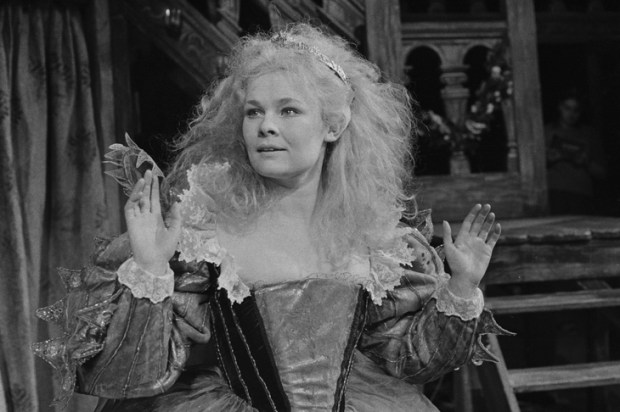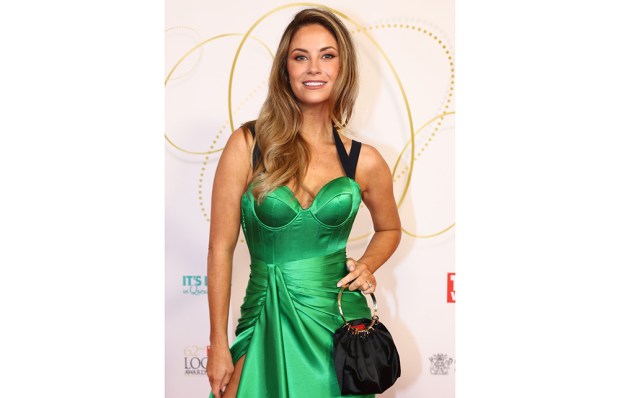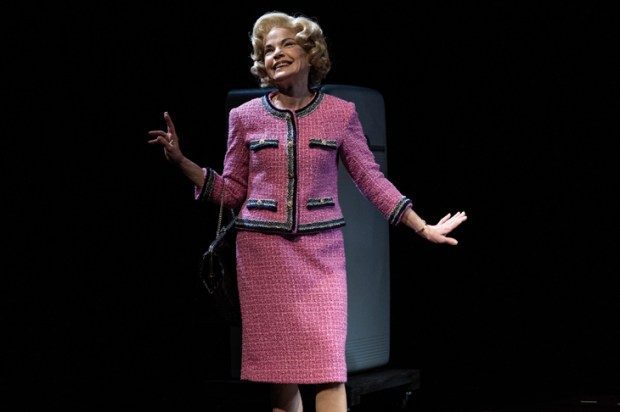People have always fiddled with Shakespeare. Nahum Tate did not give King Lear a happy ending because he was a dramatic moron but because there are indications that Shakespeare considered this possibility and Lear’s reunion with Cordelia has a resemblance to his last plays, the tragicomic romances.
All of which brings us to the strange phenomenon of Macbeth: An Undoing which is a rehash of the Scottish tragedy from Lady Macbeth’s point of view. This production has one exceedingly bright idea which is the casting of Bojana Novakovich as the supposedly fiend-like queen. Novakovich is a star and she brings to the reconfiguration of Macbeth a ferocity and depth of humanity that takes away the breath.
She was the stalker of a Germaine Greer figure in Joanna Murray-Smith’s The Female of the Species, did Nick Cave’s Woyzeck and Benedict Andrews’ Eldorado. More particularly, she was ravishing in the two seasons of the streamer Love Me with Hugo Weaving and Heather Mitchell. And she wrenches Lady M into a palpably more realised figure than the one we encounter spurring Macbeth on to murder with scathing sanity only to go mad as a consequence.
Lady Macbeth is one of the greatest roles in Shakespeare but also one of the shortest. This version changes all that with Bojana Novakovich using every bit of her formidable and fiery armoury of histrionic potency to create a figure who can kill, who can conjure, who can dream of the children she has had and the ones she would still like to have to redress their deaths. It is a wildly anti-classical conception but it has an electric energy and an intense and rampant sexuality that carries all before it.
This is a woman who is born to rule and who overmasters her dim and broken- down husband at every point. She hops and nips and cajoles and charms. The effects are achieved as often as not in defiance of Shakespeare’s iambic pentameter, the emotion in Novakovich’s characterisation is not in the cadence but through it or round about it. This produces a kind of giddying improvised effect as if the text had been shredded and turned into confetti for a tragic wedding, a commingling from which there is no return.
But the naturalism of the style she hits on – which is wild and fluttering and nothing if not moody – does wonders to bridge the pretty monumental gap between Shakespeare at his darkest and most brilliant and Zennie Harris’s rather ordinary notes towards Lady M as a kind of predestined warrior queen. In this re-write it is she who becomes the actualisation of a Machiavellian virtue that makes her the very principal of lordliness and power. And if you think Novakovich’s naturalism is rough – and it’s nothing if not spontaneous-sounding – it’s worth remembering that although Shakespeare is a great dramatic poet (who arguably cannot be imitated without folly) his drive towards naturalism among other things was massive.
Vincent Buckley, the poet and critic, had a bee in his bonnet about how Shakespeare’s lines could be given to different characters because they were in fact not characterising. He was half-right and Bojana Novakovich brings a sweeping power to how this can revivify the Queen.
Imagine a quiet, deadly speech like ‘Canst thou not minister to a mind diseased’ applied to a Macbeth lost in a great tide of bewilderment. And looking at him cold-eyed in the ruination of her love and the dream of her motherhood here is the woman of steel with the prerogative of her ironic perspective, the withering candour of her insight into a world that can never go right least of all with the man she once loved. There is a graphic scene when a ‘damned spot’ of blood keeps appearing on the lap of her dress and she keeps tearing dress after dress off in the hope of some cleanliness that can hardly be redemption.
There is also a very fine pulled-back rendition of ‘Tomorrow and tomorrow’ from what can only be a broken heart. It’s worth remembering too that although Shakespeare’s poetry is inimitable the broad sweep of even his greatest plays is rhetoric and in pursuit of that – and with an actress like Novakovich – the unthinkable becomes possible. She should do more Shakespeare, do it more classically and with the kind of director who can help her negotiate the language. Someone like Trevor Nunn or one of his associates or simply a top-notch director like Matthew Warchus.
Matthew Lutton directs the play with an apparently aimless revolve giving predominance to massive and towering walls of concrete with Dann Barber providing a series of vistas of starkness or empty menace. Natasha Herbert does what she can as a sort of madam chair of tutelary servants and spirits. Johnny Carr is a flatly ockerish Macbeth throwing away language that is multitudinous in its majesty. He is a bit too easily the footnote to his wife’s cunning and capacity for feeling, negative and positive. Jessica Clarke’s Lady Macduff wanders from the get-go with a cushioned stomach to indicate her pregnancy and there is a general tendency to make flat-footed and obvious what is there as an aura of suggestion in Macbeth. Who but Shakespeare could show the Macduffs as a happy family in the context of dramatised atrocity?
And Lutton throws away big scene after big scene, including Banquo’s ghostly reappearance. Macbeth: An Undoing provides the context – wavering between dramatically over-determined coherence and a collage of summaries of the original – which allows the audience to select different performances according to taste given that everyone is acting in a different style.
There has always been the myth that Macbeth, the shortest of the tragedies, is in fact the edited version done by Shakespeare’s contemporary Middleton (the author of that dramatic masterpiece The Changeling) and that the full play, now lost, was longer.
This is dubious. We can tell the Hecate scene is not Shakespeare. And the smallness of Lady Macbeth’s role doesn’t stop it from being extraordinary. Even Glenda Jackson who said it was too short eventually succumbed and played it.
It’s to Bojana Novakovich’s credit that she has lavished her magnetism on this weird revamp. The upshot wobbles and is sometimes all over the place but it brings out – sometimes stumblingly or with a shattered luminescence – how this play could have been written for a king obsessed by witches.
Got something to add? Join the discussion and comment below.
You might disagree with half of it, but you’ll enjoy reading all of it. Try your first month for free, then just $2 a week for the remainder of your first year.













